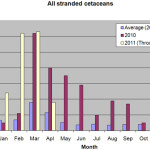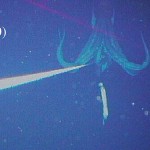As I finish off my day, three separate stories are rolling around in my head.
- This year’s Gulf of Mexico dead zone, that fun-loving anoxic zone of death, didn’t meet size expectations but is still the third largest. Is this good or bad? Texas not wanting to be outdone by Louisiana, now boasts its own dead zone.
- Next is a paper published in a relatively unknown journal with a low impact factor but its findings, pending a further evaluation, are intriguing nonetheless. Researchers from Saint Louis University (SLU) and Peking University in China are revealing for the first time the findings of a discovery that could change the way we think about the development of life on Earth.
Two years ago, Timothy Kusky, Ph.D., the Paul C. Reinert Professor of Natural Sciences at SLU, and Jianghai Li, a professor of geological science at Peking University, dug up hundreds of fossilized black smoker chimneys in northern China…The discovery is important, the researchers say, because it lends support to the theory that life on the planet developed on the sea floor.
Why haven’t we heard more of this?
-
If we encountered alien life, would we recognize it? I don’t mean large, ambulatory, tentacle-snapping organisms with eyeballs on the ends of stalks. Those are always obvious. I’m talking about the low-key, chilled-out microscopic life-forms that might be lurking below the surface of Mars, or beneath the crust of one of Jupiter’s jumbo moons, or in some such exotic, slightly scuzzy planetary environment where you’d definitely never find a Starbucks. What are we looking for, exactly, when we search for alien life? What is life?
writes Joel Achenbach. The answer provided by the National Research Council, “The Limits of Organic Life in Planetary Systems.” Life may exist in forms completely unlike anything we see on Earth. We need to keep our minds open to the possible existence of Weird Life. The novel adaptations that deep-sea life exhibit and the strange forms use to jar me a bit. Now I am much more used to it. Weird life indeed, maybe astrobiologists need to hire me as a consultant.






Regarding the black smokers (which I’ve posted about myself), it’s an exciting find, but it should be emphasised that whilst these things are 1.4 billion years old, there’s evidence of life going back more than twice as far in the geological record. Given that, some of the press releases are a little far-reaching in their claims…
Yeah, maybe the “life” that scientists are looking for out there – isn’t even carbon based.
maybe it’s silicate based.
ever consider that?